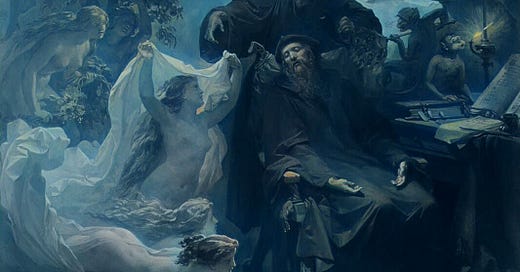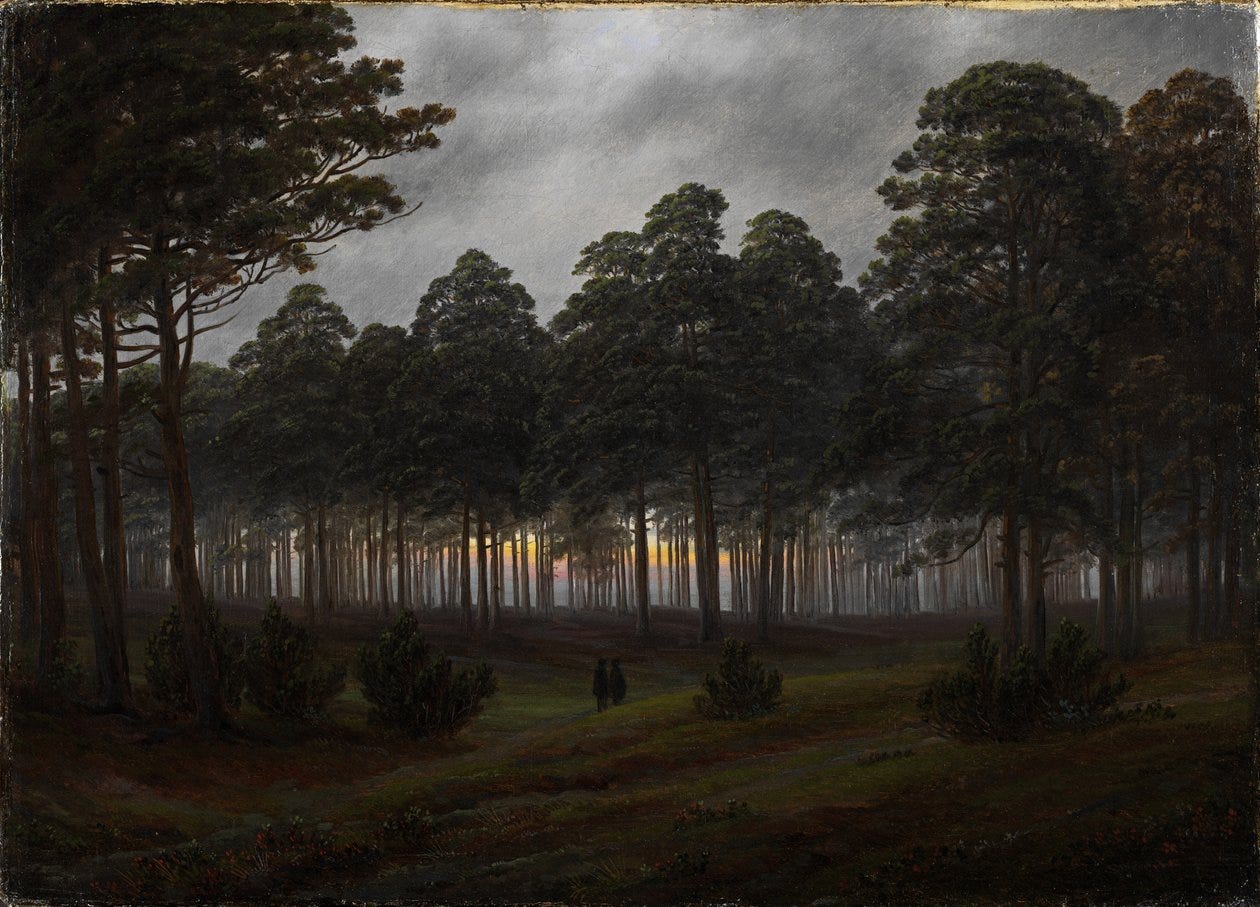Archetypes of Creativity: Director, Clown, and Poet.
From Faust: A Tragedy, Book I, Dedication and Prelude on the Stage.
Dear Reader,
This is my first post on Johann Wolfgang von Goethe’s tragic play, Faust. I first encountered the play in 2018, and ever since, its scenes and quotes have frequently resurfaced in my thoughts at various moments in life.
I’ve now decided to revisit Faust with a deeper focus on its symbols, allegories, and verses, using John R. Williams’s translation for Princeton University Press as my guide.
In this post, I’ll be exploring the Dedication and Prelude on the Stage sections. While it contains no spoilers, I highly recommend reading these parts in full to truly grasp the profound genius of Goethe—something I can only touch upon in a single post.
Vashik Armenikus
Ananke & Dedication
Once more I sense uncertain shapes appearing,
Dimly perceived in days of youth long past.
Now in my heart I feel the moment nearing
When I can hold the phantom figures fast.
~ from Dedication of Goethe's FaustImagine being able to take a walk or share a meal with an artist you deeply admire, even revere—someone whose work you strive to emulate. Who would that be?
For the young Johann Peter Eckermann, it was the great German poet Goethe. He met his hero and used to take long walks with him. During one of those strolls, Eckermann shared with his mentor his desire to write a long, probably epic, poem. Goethe told his pupil to postpone this plan for much later in life.
‘It requires a vast amount of exertion and mental effort just to shape and organise a great whole, and a vast amount of energy’ - said Goethe to Eckermann - ‘plus a period of uninterrupted peace and quiet in one’s life, to get it all down on paper in one continuous draft.’
We see this same advice repeated right at the start of Goethe’s own masterpiece, a tragic play called Faust. The entire work is filled with alchemical references and mystical allusions that have captivated readers’ minds, leaving them engaged in interpretation ever since its publication in 1808. It’s no surprise, then, that even the Dedication, which opens the play, has become a subject of speculation.
Usually, writers and artists dedicate their works to the Muses that inspired them or call for the Muses to inspire them so they could write their masterpieces in the first place. Homer and Virgil do this at the start of their poems as does John Milton in the first lines of his Paradise Lost.
Goethe’s Dedication however is godless. The great German begins with ‘the uncertain shapes appearing’ which he ‘dimly perceived in days of youth long past’. ‘Within me now a youthful passion surges as from a magic spell their throng emerges’.
Those words fall on our minds as some kind of alchemical potion. ‘They cannot hear the songs within these pages, Those souls to whom I sang; I sing alone.’ All the unnamed companions that followed Goethe were ‘cruelly treated’ by the ‘capricious fortune’ and ‘all too soon of joy and life were cheated’ and thus he ‘sings alone’.
But still, there is a spirit that lurks between these mysterious lines - I believe that spirit belongs to Ananke, the goddess of necessity, compulsion, and inevitability. She is the sister of Chronos, the god who personifies time.
In his Dedication Goethe tells us the time has come to write this tragic play. It is necessary to write it since he now can now…
... feel a long-forgotten yearning;
That solemn, quiet world calls me once more,
Its spirit music to my lips returning
Like the Aeolian harp's uncertain chord,
I tremble, and my cheeks with tears are burning,
The stern heart softens, melted to its core.
What I possess now vanishes before me,
And what was lost alone has substance for me.
These words echo closely with what Goethe advises to his pupil Eckermann during their walk. You must write a great work when the goddess Ananke tells you it is necessary. She will let your heart feel that the moment is nearing when you can hold ‘those phantom figures fast’.
Writing a great work of literature is a demanding engagement that will take many seasons of your life. Your mind will be entirely swallowed by the depth of the task. This laborious effort cannot be sustained on motivation or inspiration alone, it can only be pushed by Ananke, by necessity to express something that you cannot contain in yourself anymore. Just as a child grows in the mother’s womb until it is ready to emerge and see the light, a great work of art develops within you. It blossoms in your inner garden and only intuition can tell if you are ready to give birth to an important masterpiece.
This is what Goethe’s Dedication aims to convey in my humble perspective.
Archetypes of Creativity: Director, Clown and Poet
Goethe’s Faust begins with a Prelude on the Stage set between the Director, Poet, and Clown. I believe that these three characters are allegories (or call them types, archetypes) of our creative spirit. To fully grasp these three and what role they play in our life let us explore briefly their conversation.
The scene begins with the Director addressing his two friends - a poet and a clown.
You two have stood beside me now
For years and shared my troubles all the way.
I'd like to have your views on how
To make our mark in Germany today.
The whole speech is beautiful, as is the rest of this play, but several lines later the Director reveals a creative crisis that many of us face:
I know they are not accustomed to the best,
But they've all read so much they know the tricks.
By “they,” the Director refers to the audience he aims to please, and what’s intriguing is his remark, “I know they are not accustomed to the best.” This implies that better plays could be written and performed, but the crowd, having consumed so much, is already familiar with all the tricks of the trade.
And who can work this miracle? I say
The poet can: my friend, do it today!
The poet tells the Director that he will not be tempted to please “the many-headed”, every great poet “to the silent Muse is wedded” and continues to say that “What glitters for the moment is but passing; Posterity will value what is lasting!”
Goethe’s portrayal of the Poet evokes a figure reminiscent of a Caspar David Friedrich painting—a solitary, misunderstood, and melancholic alchemist, crafting his secret spells solely for his own contemplation. For him, sharing wisdom with the crowd is a self-betrayal. The Poet’s seclusion is not driven by snobbery or elitism; quite the opposite, it stems from a deep reverence for the creative process. The Poet draws inspiration from private conversations with the Muse, and allowing others to hear these sacred exchanges would be a betrayal of the divine spirit that inspires him.
Then it comes the turn of the Clown to speak.
I don't want to hear about posterity!
And even if I did, what's it to me?
It's here and now they want to have some fun,
...
Let your imagination weave its magic spell,
Let sense and reason, love and passion have their say -
But let us have a bit of fun as well,
Upon the first reading, I felt a certain repulsion to the character of the Clown. I felt as if his purpose is to cheapen the deep ideas that brew in the Poet’s mind, to drag them low, to make them comprehensible to the uneducated, ignorant, and arrogant crowd.
But after some reflection, I began to see some noble traits in his words. The Clown doesn’t tell to our Poet to lower his ‘magic spell’, all he entreats him to do is to act now. The Poet’s mind is engrossed in timeless ideas that will drown in oblivion if he does not express them here and now. The immediacy, the necessity, the goddess Ananke that we have explored in the first part of this essay comes into play here.
You have no idea what it does to me
To prostitute my talents in this way;
You want the sort of rubbish you can see
In any West-End theatre every day.
...
You want the poet to betray his Muse?
...
Oh, go and find yourself another slave!
What follows is a dance that takes place in the soul of every creative heart, as we witness how the melancholy Poet must be drawn into the light by the Clown, a figure who resides within us all.
“Why don’t you use them [poetic talent] then, these splendid powers? Let’s see them in this theatre of ours!'"
The Clown continues:
Our finest youth will flock to see your play,
Expecting some momentous revelation;
Their melancholy minds will soak up what you say
And in your words they'll find sweet consolation.
He essentially asks our Poet to produce the evidence of his creative powers. This reminds me of a friend who used to say he had a brilliant plot for a book he intended to write, yet he never actually sat down to write it. This is when the Clown must act, it is about bringing what is on your mind into the light.
We have explored the role of the Poet, of the Clown, but what role does the Director play in creativity?
You know exactly what we have to do –
To give them something with the kick in it,
So hurry up and make a decent brew.
Don't leave it till tomorrow, stick at it –
Today will pass you by before you know.
You've got to grab your chance, or else it's gone,
It doesn't come round twice, so don't be slow,
And once you've taken it, don't let it go;
that's the only way to get things done.
I have copied down this passage on the front page of my journal. The lines that I highlighted are particularly helpful reminder. “Don’t leave it till tomorrow”, “Today will pass you by before you know”, “You have got to grab your chance, or else it’s gone,”
This echoes another piece of advice that Goethe provided his pupil Eckermann. The great poet said that an artist needs to learn how to convert ordinary moments in life and see in them extraordinary events. This requires skill but what is more important of all - it requires power of will.
The Director serves as an allegory for the Will, the force that drives us to take action. While the Poet conjures a great idea and the Clown brings it to light, it is the Director who pushes the artist to execute and bring the idea to fruition.
These three characters—Poet, Clown, and Director—exist within us all, each playing a vital role. We’ve all encountered artists who lack the “Poet” but have a strong “Clown” or “Director,” often resulting in art that, while entertaining, lacks depth. At the same time, we don’t know how many poets have vanished into oblivion because they did not have anyone who would bring their genius into the light. How many great works of art were left unfinished because there was no strong “Director” who could supervise their execution?
Every artist knows at least the partial answer to this mostly rhetorical question.
Confide tibimet.









I thoroughly enjoyed reading your reflections, Vashik! Conversations with Eckermann is my constant companion, and there's always something to learn from Goethe, though sadly, Ananke doesn't always grace us with her presence :)
I'm debating between rereading Fusto or Divine Comedy, I mean, I want to reread both but can't decide which first jaja
This post is amazing!